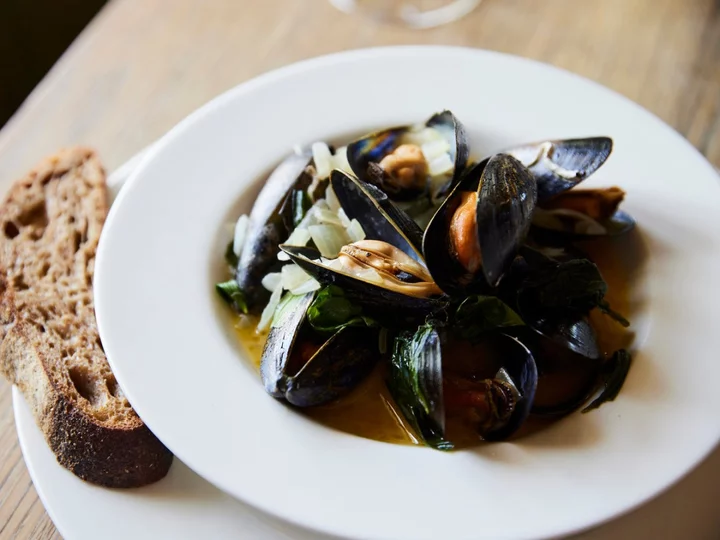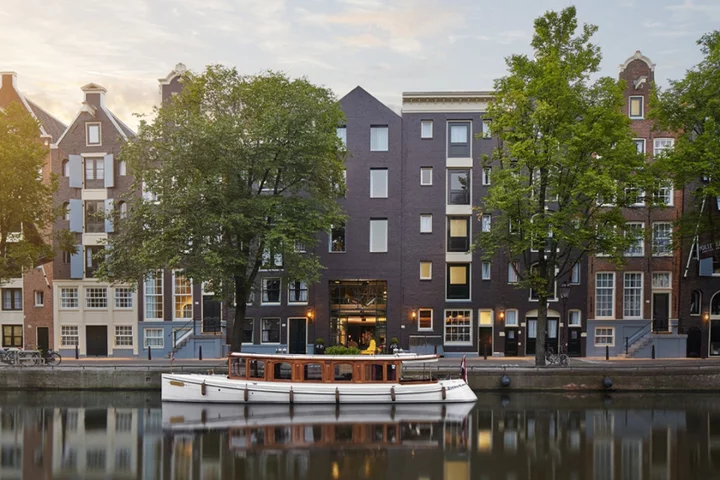
Mick Jagger, father of eight, explains why parenting is ‘not like riding a bike’
Father of eight Mick Jagger has shared some of the lessons he’s learned about parenting. The 80-year-old singer addressed how his approach to fatherhood has changed over the years during a recent interview with The Guardian. His eight children range from ages 52 to six years old, as he welcomed his youngest son, Deveraux, with his current girlfriend, Melanie Hamrick, in 2016. Speaking to The Guardian, Jagger confessed that even when he welcomed his eighth child, he still had a bit to learn about fatherhood. “You get a bit out of practice – it’s not like riding a bike,” he said. “The more children you have, the more laissez-faire you get about them, to be honest. And it depends on the child.” The Rolling Stones frontman reflected on how he’s enjoyed seeing his children develop new passions as they’ve grown up. However, he also acknowledged that there were a few moments in his children’s lives that he missed out on due to his busy career. “They have their own personalities and you can mould them to a certain extent, but you see their likes and dislikes and encourage them to do things they gravitate towards,” he said. “It’s fun to have children, at any age. But if you’re working and always away, you don’t get to enjoy it quite as much.” Jagger also explained why his approach to parenting is different with his youngest son, in comparison to his other children. “I wasn’t working so much, so I was able to spend more time. And then we had the lockdown – he’s only six, and two of those years I did almost nothing [with the band],” he said. In addition to Deveraux, Jagger has seven children from previous relationships. In 1970, Jagger welcomed his first child, Karis, 52, with actor Marsha Hunt. The next year, his ex-wife Bianca Jagger gave birth to their daughter Jade, 51. He shares daughters Elizabeth, 39, and Georgia May, 31, and sons James, 38, and Gabriel, 25, with actor Jerry Hall. In 1999, he and model Luciana Gimenez Morad welcomed their son Lucas, 24. This isn’t the first time that Jagger has spoken candidly about his family. Last month, he hinted that the Rolling Stones’ post-1971 catalogue would be donated to charity rather than sold for a profit to his children. “The children don’t need $500m [£412m] to live well. Come on,” Jagger told The Wall Street Journal. “You may do some good in the world,” the “Old Habits Die Hard” singer added, suggesting that the catalogue may end up going to charity. Earlier this year, his partner opened up about raising their six-year-old in the midst of her busy schedule. After debuting her first novel, titled First Position, Hamrick described some of the “magical” trips she’s taken with her partner and son, including a safari in Botswana and South Africa. She told The Times in June: “Mick had been joking with me, ‘We’re going camping.’ I was like, ‘I don’t want to go camping. I’m not a camper.’ We got there and I was like, ‘This isn’t camping.’” She described how her family prefers to live at different residences at a time, before acknowledging how important travelling is to her and Jagger. “Just full nomad. We want to travel as long as we can until school gets us,” she said. The former dancer also noted that her child has a tutor who travels with them, as the six-year-old is enrolled in a school in Los Angeles and “goes [to school] a little bit when we’re in France”. Read More Should we stop putting the clocks back? What the experts think Like Rebecca Adlington, I also lost my baby at 20 weeks As Rebecca Adlington shares heart-breaking miscarriage news: How to support others experiencing baby loss
2023-10-25 05:15

California Halts Cruise's Self-Driving Cars Citing 'Risk to Public Safety'
California’s DMV is suspending Cruise’s permit to test self-driving cars in the state over concerns
2023-10-25 04:21

Passkeys: What They Are and Why You Need Them ASAP
I’m sick of passwords. They’re somehow both easily guessable and hard to remember, and keeping
2023-10-24 23:16

Love it or hate it, feelings run high over candy corn come Halloween
Cruel joke for trick-or-treaters or coveted seasonal delight
2023-10-24 20:18

Jack Stein’s Cornish mussels with spinach and cider
For National Seafood Month (October) this year, I’d like to celebrate Cornish rope grown mussels and encourage more people to cook them at home. Juicy, sustainable, and nutritious, they are a lower-impact species but often consumed less than industrially caught seafood such as prawns, tuna, cod and salmon. They’re grown on long ropes out in St Austell Bay, and the best thing about them is they’re incredibly sustainable – feeding off the nutrient-rich water before being harvested, which means there’s no damage to any reefs or the shoreline. This also means they’re super clean with hardly any beards to cut off before cooking. They’re also great value at around a tenner for two decent bowlfuls, of which you can do so many recipes. I love classic moules marinière with onion, white wine and parsley, or, as below, mussels with spinach and cider – perfection! Mussels with spinach and cider Ingredients: 1.75kg mussels Handful of spinach leaves (when in season, these could be swapped for wild garlic) 2 shallots, finely chopped 15g butter 100ml Cornish cider, or your favourite local equivalent Plenty of crusty bread to soak up the sauce Method: 1. Wash the mussels under plenty of cold, running water. Discard any open ones that won’t close when tapped on a board. 2. Pull off any tough, fibrous beards attached to the tightly closed shells. Give the mussels another quick rinse to remove any little pieces of shell. 3. Soften shallots in the butter in a large pan. 4. Add the mussels and cider, turn up the heat, then cover and steam them open in their own juices for 3-4 minutes. Give the pan a good shake every now and then. 5. Add spinach and remove from the heat and allow to wilt. 6. Spoon into four large warmed bowls and serve with plenty of crusty bread. Jack Stein is chef director at Rick Stein Restaurants. You can buy Cornish rope grown mussels from Rick Stein online for £10. Read More Dear Pret, this is what a £7 sandwich should look like Pub grub: Three recipes from Tom Kerridge’s new cookbook From Nepal to Tibet: Eight warming dishes from the coldest places on earth Two seasonal stews to keep the chill off this autumn Farmers’ markets in autumn are a cornucopia of colour Spice up your life: Three recipes from Nadiya Hussain’s new book that bring the heat
2023-10-24 13:59

Toyota's Next EV? New Concepts Include Compact Pickup With 400-Mile Range
Toyota shared its latest EV prototypes ahead of this week's 2023 Japan Mobility Show, and
2023-10-24 10:19

2023 Hyundai Ioniq 6 Review
Starting at $41,600, the Hyundai Ioniq 6 is the rare affordable EV sedan merging into
2023-10-24 07:26

Pulitzer, Amsterdam hotel review: Luxury, local cuisine and decadence in this Dutch period piece
In a nutshell: In Amsterdam’s oldest five-star hotel, no two rooms are the same, restaurants serve up local cuisine, and a 1909 saloon boat offers tours of the city’s canals. The neighbourhood Amsterdam attracts visitors from all around the world thanks to its rich history, eclectic museums, bike lifestyle and coffee shop culture. The city is wonderfully walkable and the five-star Pulitzer hotel places you in prime location to explore all the Dutch capital has to offer. Looming over the canal belt and in the heart of the historic Nine Streets neighborhood (right out of a Wes Anderson movie), this quintessential district is brimming with boutique shops, charming cafes and enticing restaurants. Located five minutes down the canal, you’ll find Anne Frank’s house while the Museumplein (home to Rijksmuseum, the Van Gough museum and Moco), Amsterdam Centraal and Vondelpark are a mere 20 minute walk away. If you’re keen to cycle like a local, the hotel is equipped with Pulitzer bikes and the erudite concierge Ron Stoevelaar is on hand to show you the best routes. The look Set within 25 Golden Age canal houses, the Pulitzer forms an entire block in the Nine Streets area. Founded in 1970 by Peter Pulitzer (grandson of the Pulitzer Prize founder Joseph Pulitzer), the hotel went through a £1.5 million restoration in 2016. The hotel combines 17th century Dutch elements and mid-century design (think beamed ceilings, historic fireplaces, period antiques and an impressive collection of art, books and music) with contemporary features. Every nook (and there’s many) of the hotel offers a glance into the past – whether it’s in the library of Pulitzer Prize winning books, the lobby with Persian rugs and paintings or in the four luxury collectors suites. Exemplifying the old meeting the new, look out for what appears to be a 17th century painting of a floral bouquet in the lobby. A closer look will reveal it to be a photograph of melted cutlery by a contemporary artist. The vibe Oozing elegance and class, the Pulitzer’s architectually impressive buildings are enriched with antique pieces and Dutch design details. A beguiling space, the grand lobby has a buzzy atmosphere thanks to the laid-back Pulitzer Garden bar and eatery that are tucked away toward the back, while the check-in and concierge desks are warm and welcoming. Upon arrival, you’ll spy an eclectic clientele of 30-somethings talking over old fashioned cocktails at the bar, upmarket travellers in the mid-century armchairs, older couples chatting to the concierge and families feasting in the lobby’s Italian-inspired restaurant. Stepping out of the Pulitzer doors and onto the canal side, picturesque Amsterdam – without the chaos of the main streets – is on your doorstep (just try not to collide with any of the bikes swishing past). Bed and bath Despite being home to more than 200 rooms, the hotel has a cosy, boutique feel owing to the canal house layout and warren of mood-lit interlocking corridors (there’s much enjoyment to be had in getting lost in the Pulitzer). Each room is unique and inspired by an aspect of Dutch design. With themed-collectors suites, family size spaces and canal-view rooms – as well as generous, cosy and classic spaces available – there’s a room to suit every kind of traveller. Featuring decadent marble bathrooms (complete with luxury Debaser toiletries and well-pressured power showers), the rooms boast custom made headboards, a work desk with a mirror, mid-century drinks trolleys and chaise lounges. Thoughtful details such as bookshelves, a bike repair kit, an umbrella, French press and Dutch sweet treats all elevate the space, while windows either look out over the canal, the street below or the Pulitzer garden in the centre of the hotel. You can opt in or out of having your sheets changed each morning – the hotel reminds you of the importance of saving water – by placing a card on your bed. Food and drink There are two restaurants on site at the Pulitzer: the all-day dining eatery Jansz and the more laidback Pulitzer Garden restaurant. The former favours locally-sourced ingredients and classic Dutch cuisine, with the lunch and dinner line-up brimming with seasonal small plates, freshly caught fish dishes (the shrimp croquettes and octopus were a delight) and refined classics like burgers and steaks. Jansz is also where breakfast is served, with guests able to order a la carte (the omelette is a must) or try the continental buffet. Open for breakfast, lunch and dinner, the Pulitzer Garden has indoor and outdoor tables with a hearty menu inspired by Italian cuisine – think aubergine parmigiana, lobster spaghetti and chicken caesar salad. After dinner, be sure to head to the glamorous and deliciously moody Pulitzer Bar. Sink into the armchairs, sofas and bar stools to while away the evening with signature or classic cocktails (try the breakfast margarita and new Amsterdam). Public areas The neighbourhood-style complex includes the Jansz restaurant, Pulitzer Garden bar, restaurant and garden seating, the Pulitzer Bar and the resplendent lobby. Whether you’re a guest or not, the Pulitzer bar is a must-visit. Elegant and free from the havoc of city centre bars, the Art Deco-style bar looks over the canal and is the perfect spot for people watching. Open to guests, there’s also a 24-hour gym at the Pulitzer with machines, yoga mats, weights, towels and chilled water. When visiting the Pulitzer, you’ll notice two gleaming boats docked in front of the hotel. The Tourist (which famously took Winston Churchill on a trip through the city in 1946) and the smaller Belle are available for private and group tours for guests and the public at an extra cost. Built at the beginning of the 20th century, the interiors are complete with polished teak and brass, luxurious carpeting, marble, leather and original bevelled glass. Lasting 90 minutes, the concierge’s guided cruises take you on a whistlestop tour of the city’s canals – and there’s a self-service mini bar for on-board drinks. Nuts and bolts Room count: 225 Freebies: Breakfast at Jansz restaurant (if included in your booking); gym access; Pulitzer tote bag; Pulitzer card deck; welcome stroopwafels; coffee or tea in the room. Wifi: Free. Extra charges: Room service; additional beds for children; pets. Disability access: There are fully fitted accessible guest rooms available to reserve. Pet policy: A small dog or cat is allowed in rooms at a cost of €50 per day. Bottom line Best thing: Impeccable service, prime location for exploring the city, excellent restaurants and an intimate bar. Worst thing: Some might not get on with the thin doors and walls in the bedroom (it is an old building after all), meaning you can occasionally hear movement in the corridor. Plus, we would have liked to see slightly more reasonable prices in the otherwise more laidback Pulitzer Garden restaurant. Perfect for: Upmarket travellers, foodies, couples and families. Not right for: Those after a budget city break. Instagram from: The moody Pulitzer bar, canal-view room, The Tourist boat tour or Jansz window tables. Room rate: Double rooms from £351 a night. Read more of our hotel reviews: The elegant Landmark Hotel London Luxury hotel meets B&B at The Dante House The Ritz-Carlton, Abama hotel review Read more on Amsterdam travel: Amsterdam travel guide: Best things to do Best hotels in Amsterdam Everything British tourists shouldn’t do in Amsterdam Read More Independent Traveller guide to best hotels and short breaks Best UK hotels 2022 Best hotels in Paris for 2023 Amsterdam travel guide: Best things to do and where to stay for a 2023 city break The best holidays to book for November, from winter sun in Oman to Scandi Christmas markets Best hotels in Europe 2023: Where to stay for a city, beach or retreat break
2023-10-24 04:55

As Rebecca Adlington shares heart-breaking miscarriage news: How to support others experiencing baby loss
Rebecca Adlington said she is “truly heartbroken” after suffering a late-stage miscarriage. The double Olympic gold medal swimmer found out about the devastating loss at a routine 20-week scan, sharing the news in a post on Instagram yesterday evening. “I don’t really have the words right now but unfortunately we went for our 20 week scan this week and they found no heartbeat. I gave birth to our angel, Harper on Friday at 7pm. We held her, and had time with her. We will forever love her and remember her always,” Adlington, 34, said. After thanking staff at Wythenshawe Hospital for their “kindness and care”, she added: “I don’t have the strength or words right now and don’t feel ready to share this news. However, I can’t pretend to be ok or fake a smile. I can’t have people ask me how pregnancy is or when I am due as I still look pregnant. I don’t have the strength to tell this news individually. “We are so truly heartbroken. Our beautiful girl. Rest in peace.” Adlington – who shares son Albie, two, with her husband Andy Parsons and has an eight-year-old daughter, Summer, from her previous marriage with Harry Needs – previously revealed she’d had a miscarriage 12 weeks into her pregnancy last August, resulting in emergency surgery. And as her Instagram post this week highlights, one of the many difficult things about losing a baby is telling other people. So, how can people respond supportively when a friend, relative or colleague shares news of a baby loss? Showing empathy “It’s about showing empathy as much as you possibly can, showing some form of understanding, and really just being there to listen to them,” Rochelle Love, a midwife working with baby loss charity Tommy’s, told the PA news agency. A late miscarriage is one which happens between 14-24 weeks of pregnancy, and is less common than early-stage miscarriage, occurring in an estimated 1-2% of pregnancies, Love explained. “We don’t always know why these miscarriages happen. They can be for a multitude of reasons, and the sad thing for expectant parents is that we may not always find a definite cause,” she added. “It may not necessarily be related to previous miscarriage.” Take care with ‘helpful’ comments Friends and family may try to comfort someone who’s lost a baby with well-meaning but sometimes way off-the-mark ‘helpful’ comments. Love said it’s crucial to be very careful about what you say. “I don’t think it’s ever up to us to make assumptions, and especially do not make comments like: ‘Don’t worry, you can have another baby’, ‘Don’t worry, you can try again’, or, ‘You were only 20 weeks pregnant’,” Love advised. “I think sometimes people just don’t know what else to say, so they make these throwaway comments, which are not necessarily the best things to say when someone’s grieving. It’s not up to us to say [these things] – how do you know, for example, that they can have another baby? Think about what you’re going to say before you speak to someone who’s had a loss.” Be mindful of terminology Remember this isn’t just a foetus to the grieving parents – it’s their child, and it can be very important to talk about it as such. Love said: “Address the baby as their baby, and if the baby has a name, then use it. Be very careful of the words you use.” Be there for them Instead of offering up platitudes, Love said it’s often better to just let people know you’re there if they need you. “Just let them know you’re there for them – you’re there if they want to speak, or if they just want to sit in silence – you’re available to be their support if and when they should need it,” she explained. Don’t forget their partner Love stresses that any kind of support needs to be extended to the partner as well. “Sometimes the partner is ignored and we just focus on the pregnant person, but the partner is the pregnant person’s closest support and they’ve also lost their baby and are also grieving,” she said. “I always advise anyone who’s had an unfortunate loss that if they decide to go for grief counselling, they should make their partner a part of that process as well, so they can go on that grief and healing journey together.” Remember everyone will grieve differently Loss and grief is experienced differently by everyone. “How I may grieve a pregnancy loss may be very different from how somebody else might grieve,” said Love – so it’s important to let people do things their way and at their own pace. Think about offering them helpIf you are close with them, offer practical help if you feel they may welcome it. Love said this could mean “getting someone’s groceries for them because they don’t feel they can face getting dressed and going out, or cleaning the house – anything at all could be very well received.” Tommy’s helpline is on 0800 014 7800 Read More What you need to know about new research into treating cervical cancer How to do Halloween make up and still take care of your skin Which houseplants best suit your star sign? 5 of the hottest new perfume launches for autumn/winter Consistent lack of sleep may increase risk of future depressive symptoms – study World Osteoporosis Day: The risk factors and early warning signs everyone needs to know about
2023-10-23 21:29

What you need to know about new research into treating cervical cancer
Using existing drugs to treat cervical cancer before standard treatment could lead to a 35% reduction in the risk of relapse or death, a new study suggests. Researchers from the UCL Cancer Institute and UCLH looked into whether a short course of induction chemotherapy (IC), where a drug is used to destroy as many cancer cells as possible, before chemoradiation (CRT), could help with this. Here’s everything you need to know about the findings… What is cervical cancer? According to the NHS website, cervical cancer is a type of cancer found anywhere near the cervix – the opening between the vagina and the womb (uterus), which is also known as the neck of the womb. Most cervical cancers grow very slowly and are caused by an infection from specific types of human papillomavirus (HPV) and mostly affect women under the age of 45. According to Jo’s Cervical Cancer Trust, symptoms include vaginal bleeding that is unusual to you, changes to vaginal discharge, discomfort during sex and pain in your lower back or pelvis. Changes to cells can be spotted by a cervical screening, and then treated before they turn into cancer. There are around 3,200 new cases every year in the UK, with the five-year survival rate being around 70%, according to Cancer Research UK. CRT has been the standard treatment for cervical cancer patients since 1999, but even though there have been overall significant developments in radiation therapy techniques, up to 30% of people experience their cancer coming back. What did the research involve? Over a 10-year period, 500 patients who had been diagnosed with cervical cancer – that was large enough to see without a microscope but hadn’t spread to other parts of the body – took part in the Interlace trial at hospitals in the UK, Mexico, India, Italy and Brazil. Researchers looked into whether a short course of IC before CRT could reduce rates of relapse and death. What results were found? After five years, researchers discovered that 80% of the people who received a combination of chemotherapy and radiotherapy were alive, whilst 73% had not seen their cancer return or spread. A major benefit, according to researchers, is that it can be incorporated into standard of care treatment relatively quickly, because cheap, accessible and already-approved ingredients such as carboplatin and paclitaxel are needed for IC. “Our trial shows that this short course of additional chemotherapy delivered immediately before the standard CRT can reduce the risk of the cancer returning or death by 35%,” said Dr Mary McCormack, lead investigator of the trial from UCL Cancer Institute and UCLH. “This is the biggest improvement in outcome in this disease in over 20 years. “I’m incredibly proud of all the patients who participated in the trial; their contribution has allowed us to gather the evidence needed to improve treatment of cervical cancer patients everywhere. “We couldn’t have done this without the generous support of Cancer Research UK.” Why is the research important? Dr Iain Foulkes, executive director of research and innovation at Cancer Research UK, said: “Timing is everything when you’re treating cancer. The simple act of adding induction chemotherapy to the start of chemoradiation treatment for cervical cancer has delivered remarkable results in this trial. “A growing body of evidence is showing the value of additional rounds of chemotherapy before other treatments like surgery and radiotherapy in several other cancers. “Not only can it reduce the chances of cancer coming back, it can be delivered quickly using drugs already available worldwide. “We’re excited for the improvements this trial could bring to cervical cancer treatment and hope short courses of induction chemotherapy will be rapidly adopted in the clinic.”
2023-10-23 20:22

Angelina Jolie: I don’t tell my kids how to dress
Hollywood star and mother-of-six Angelina Jolie says she doesn't dictate her kids' fashion choices.
2023-10-23 19:51

Disney Said to Near Multibillion-Dollar India Deal With Reliance
Reliance Industries Ltd., controlled by Asia’s richest tycoon Mukesh Ambani, is nearing a cash and stock deal to
2023-10-23 19:27
